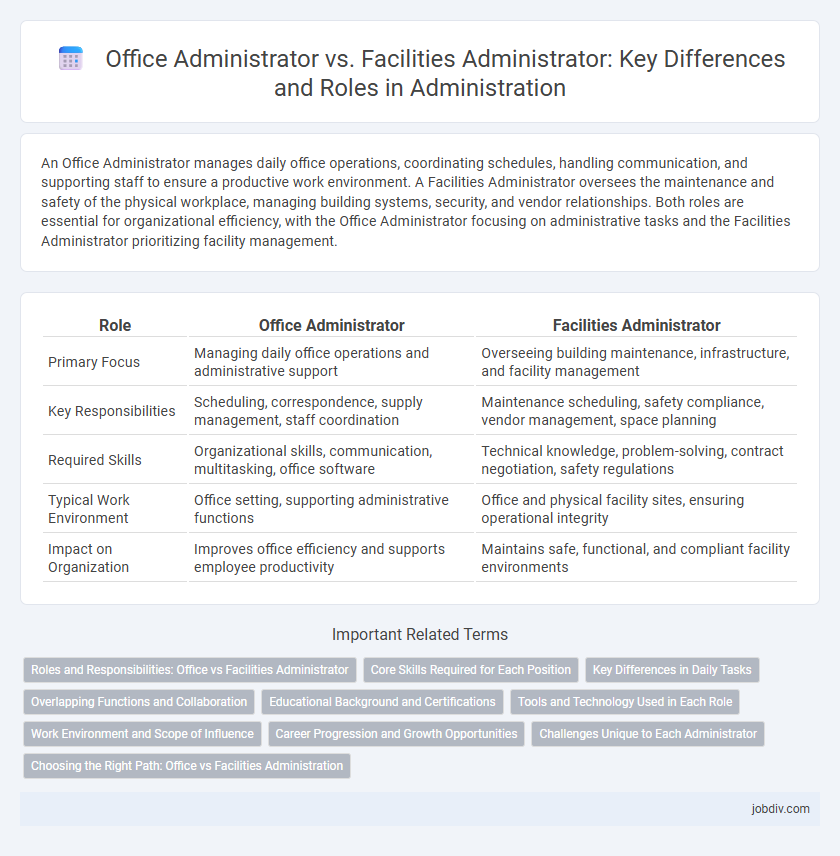An Office Administrator manages daily office operations, coordinating schedules, handling communication, and supporting staff to ensure a productive work environment. A Facilities Administrator oversees the maintenance and safety of the physical workplace, managing building systems, security, and vendor relationships. Both roles are essential for organizational efficiency, with the Office Administrator focusing on administrative tasks and the Facilities Administrator prioritizing facility management.
Table of Comparison
| Role | Office Administrator | Facilities Administrator |
|---|---|---|
| Primary Focus | Managing daily office operations and administrative support | Overseeing building maintenance, infrastructure, and facility management |
| Key Responsibilities | Scheduling, correspondence, supply management, staff coordination | Maintenance scheduling, safety compliance, vendor management, space planning |
| Required Skills | Organizational skills, communication, multitasking, office software | Technical knowledge, problem-solving, contract negotiation, safety regulations |
| Typical Work Environment | Office setting, supporting administrative functions | Office and physical facility sites, ensuring operational integrity |
| Impact on Organization | Improves office efficiency and supports employee productivity | Maintains safe, functional, and compliant facility environments |
Roles and Responsibilities: Office vs Facilities Administrator
An Office Administrator manages daily office operations, including coordinating schedules, handling correspondence, and maintaining administrative records to ensure smooth workflow. A Facilities Administrator oversees physical infrastructure, managing building maintenance, safety protocols, and vendor coordination to ensure a safe, functional environment. Both roles require strong organizational skills but focus on distinct operational areas: administrative tasks versus facility management.
Core Skills Required for Each Position
Office Administrators require strong organizational skills, proficiency in communication, and expertise in managing schedules, correspondence, and office supplies. Facilities Administrators need technical knowledge of building maintenance, safety regulations, vendor management, and budgeting for facility operations. Both roles demand problem-solving abilities and attention to detail, but differ in their focus on administrative tasks versus physical infrastructure management.
Key Differences in Daily Tasks
Office Administrators manage clerical duties such as scheduling, correspondence, and office supply inventory, ensuring smooth day-to-day operations. Facilities Administrators focus on building maintenance, safety protocols, and space management to maintain a functional and secure work environment. These distinct roles optimize organizational efficiency by addressing administrative and physical infrastructure needs respectively.
Overlapping Functions and Collaboration
Office Administrators and Facilities Administrators share overlapping functions such as coordinating maintenance schedules, managing vendor relationships, and ensuring workplace safety compliance. Both roles collaborate closely to optimize resource allocation and streamline the physical and operational aspects of the workplace environment. Efficient communication between these administrators enhances overall office functionality and supports seamless daily operations.
Educational Background and Certifications
Office Administrators often hold degrees in business administration or office management, with certifications such as Certified Administrative Professional (CAP) enhancing their qualifications. Facilities Administrators typically have educational backgrounds in facility management, engineering, or related fields, supported by certifications like Certified Facility Manager (CFM) or Facility Management Professional (FMP). Both roles benefit from specialized training to address their distinct operational responsibilities effectively.
Tools and Technology Used in Each Role
Office Administrators primarily utilize software such as Microsoft Office Suite, email platforms like Outlook, and scheduling tools like Google Calendar to manage communication, organize meetings, and maintain records efficiently. Facilities Administrators rely on Computerized Maintenance Management Systems (CMMS), building automation systems, and vendor management platforms to oversee maintenance schedules, track facility operations, and coordinate repairs. Both roles leverage collaborative tools such as Slack or Microsoft Teams, but their core technologies differ based on operational focus--administrative tasks versus physical facility management.
Work Environment and Scope of Influence
Office Administrators primarily operate within an indoor office setting, managing clerical tasks, scheduling, and communication to support business operations. Facilities Administrators oversee the maintenance, safety, and functionality of physical buildings and grounds, often interacting with contractors and service providers across multiple locations. The scope of influence for Office Administrators centers on internal organizational efficiency, while Facilities Administrators impact the broader physical environment and infrastructure supporting the organization.
Career Progression and Growth Opportunities
An Office Administrator typically manages daily administrative tasks and coordinates office operations, offering foundational experience in organizational management with opportunities to advance into executive assistant or office manager roles. In contrast, a Facilities Administrator oversees building maintenance, vendor coordination, and workspace safety, providing specialized skills that can lead to leadership positions in facilities management or corporate real estate. Career progression for both roles depends on industry experience, certifications such as CAP or FMP, and the ability to adapt to evolving administrative technologies.
Challenges Unique to Each Administrator
Office Administrators face challenges including managing diverse clerical tasks, coordinating communication across departments, and ensuring smooth daily operations within a dynamic office environment. Facilities Administrators encounter unique obstacles related to maintaining physical infrastructure, overseeing building safety compliance, and managing vendor contracts for maintenance and repairs. Both roles require distinct skill sets to address their specific operational demands while supporting organizational efficiency.
Choosing the Right Path: Office vs Facilities Administration
Office Administrators specialize in managing daily administrative tasks such as scheduling, correspondence, and record-keeping, ensuring smooth office operations. Facilities Administrators focus on maintaining the physical workplace, overseeing building maintenance, safety protocols, and vendor management. Selecting the right path depends on whether you prefer coordinating internal office functions or managing the infrastructure and environment supporting those functions.
Office Administrator vs Facilities Administrator Infographic

 jobdiv.com
jobdiv.com